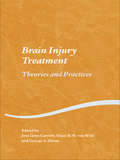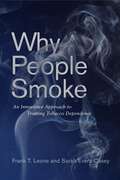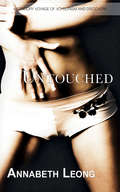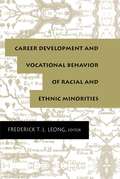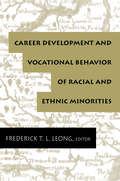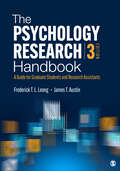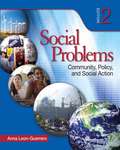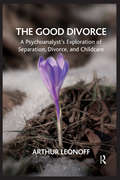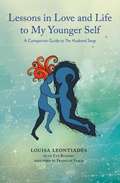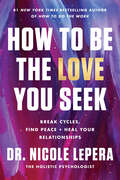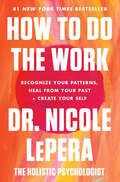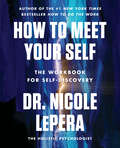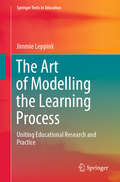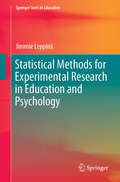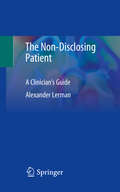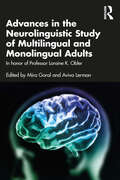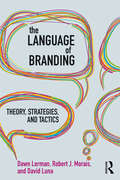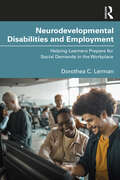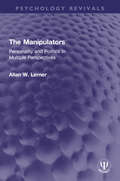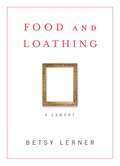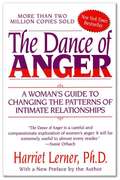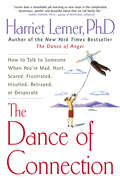- Table View
- List View
Brain Injury Treatment: Theories and Practices (Studies on Neuropsychology, Neurology and Cognition)
by Jose Leon-Carrion Klaus R. von Wild George A. ZitnayBrain Injury Treatment: Theories and Practices is a thorough and wide-ranging account of the rehabilitation of brain injury. Written from an international perspective, this book presents a detailed discussion of the basic science of brain injury. It explains the treatments used in brain injury rehabilitation and covers new methods of rehabilitation, including complementary medicine theories. It contains a wealth of information on different neurosurgical and neuropsychological treatments. It also includes a comprehensive reference to the theories underlying rehabilitation practices and chapters on community reentry and family dynamics following brain injury. It will be an invaluable tool to students from psychology, medicine, physical and occupational therapy studying the treatment and aftercare of people with brain injury.
Why People Smoke: An Innovative Approach to Treating Tobacco Dependence
by Frank T. Leone Sarah Evers-CaseyPeople have been using tobacco in a variety of forms for centuries. Remarkably, it was originally seen as something that could promote vigor and health. Of course, now we all know that tobacco use causes death and disability in epidemic proportions. If smoking is so bad for us, why in heaven’s name would anyone still smoke?Quite a bit has changed since tobacco first made the transition to a widely available agricultural product. Unfortunately, the general clinical approach to addressing this problem has failed to keep pace with tobacco technology and its addictive properties. People around the world who have fallen prey to the subtleties of nicotine addiction, or who care for those who have, would benefit from a deeper understanding of the ways in which nicotine can affect the brain’s function and change behaviors over a lifetime. Why People Smoke breaks down the science of tobacco dependence and presents it in a way that is both easily understandable and clinically useful for anyone interested in helping people break free of nicotine’s influence.Why People Smoke is a first-of-its-kind clinical guide to treating tobacco dependence. The book helps readers make meaningful connections between tobacco’s effects at the cellular level, the predictable behavioral manifestations of the disorder, and the social science and systems requirements required to make a fundamental impact on this disorder. Unlike previous publications like self-help books, step-by-step curricula, or clinical guidelines, Why People Smoke puts practical clinical insights—gained from twenty-five years of practice—into perspective, helping the reader understand how “brain change” translates into “mind change” and the persistent compulsion to smoke . . . despite a person’s desperate desire to stop.Reading Why People Smoke will change the way you see smoking forever.
Untouched
by Annabeth LeongCelia Lambent has an unusual and divisive condition - she cannot bear to be touched. And yet, her sexual appetite is voracious. As she embarks on a very unusual relationship with a new (and very patient) lover, a journey of voyeurism and discovery unrolls before her as she tries to identify the cause (and cure) of her condition.
Untouched
by Annabeth LeongCelia Lambent lives in constant conflict. Her sexual appetite is voracious, and yet she cannot bear to be touched. Untouched is a raunchy journey of voyeurism and discovery as Celia seeks the cause and cure for her condition.
Career Development and Vocational Behavior of Racial and Ethnic Minorities (Contemporary Topics in Vocational Psychology Series)
by Frederick T. L. LeongThis volume presents the single most comprehensive source of knowledge on the career development of racial and ethnic minorities. In so doing, it serves as a resource to graduate students learning about career development and career counseling, counselors and psychologists providing career counseling to racial and ethnic minorities, and psychologists and counselors doing research on the career development of these diverse groups. In recognition of the value of both culture-specific and culture-general information about the vocational psychology of racial and ethnic minorities in the United States, the book has a dual focus. The first eight chapters are devoted to culture-specific information about career development and vocational behavior. The final two chapters synthesize and integrate the materials presented in the eight culture-specific chapters. The text has been divided into three sections. The first section focuses on career theory and research with racial and ethnic minorities. It consists of a review of the relevance and utility of various career theories and models from mainstream vocational psychology to our understanding of the vocational behavior and career development of racial and ethnic minorities -- African Americans, Hispanic Americans, Asian Americans, and American Indians. These chapters also summarize other theories from ethnic minority psychology that add to our understanding of minority career development. Finally, they review the existing empirical literature on the career development of these groups and provide a critique of this literature with recommendations for future research. The second section focuses on assessment and intervention with racial and ethnic minorities. The inclusion of the assessment dimension is very important because assessment is such a large and significant component of the career counseling process with these groups. The chapter authors offer guidelines and recommendations for providing career interventions with racial and ethnic minorities. In presenting these guidelines, they also address some of the cultural factors unique to each group that may serve either as facilitators or as inhibitors in the career counseling process. The third section includes commentaries, suggestions, reactions, and syntheses of the previous sections from scholars in the field of vocational psychology. These authors identify and examine the common principles, problems, and themes running across the chapters, and offer suggestions for advancing the field of racial and ethnic minority vocational psychology. This book will become both a valuable source of current information about the vocational psychology of racial and ethnic minorities as well as an inspiration for future research into the career development and vocational behavior of these culturally different individuals.
Career Development and Vocational Behavior of Racial and Ethnic Minorities (Contemporary Topics in Vocational Psychology Series)
by Frederick T. L. LeongThis volume presents the single most comprehensive source of knowledge on the career development of racial and ethnic minorities. In so doing, it serves as a resource to graduate students learning about career development and career counseling, counselors and psychologists providing career counseling to racial and ethnic minorities, and psychologists and counselors doing research on the career development of these diverse groups. In recognition of the value of both culture-specific and culture-general information about the vocational psychology of racial and ethnic minorities in the United States, the book has a dual focus. The first eight chapters are devoted to culture-specific information about career development and vocational behavior. The final two chapters synthesize and integrate the materials presented in the eight culture-specific chapters. The text has been divided into three sections. The first section focuses on career theory and research with racial and ethnic minorities. It consists of a review of the relevance and utility of various career theories and models from mainstream vocational psychology to our understanding of the vocational behavior and career development of racial and ethnic minorities -- African Americans, Hispanic Americans, Asian Americans, and American Indians. These chapters also summarize other theories from ethnic minority psychology that add to our understanding of minority career development. Finally, they review the existing empirical literature on the career development of these groups and provide a critique of this literature with recommendations for future research. The second section focuses on assessment and intervention with racial and ethnic minorities. The inclusion of the assessment dimension is very important because assessment is such a large and significant component of the career counseling process with these groups. The chapter authors offer guidelines and recommendations for providing career interventions with racial and ethnic minorities. In presenting these guidelines, they also address some of the cultural factors unique to each group that may serve either as facilitators or as inhibitors in the career counseling process. The third section includes commentaries, suggestions, reactions, and syntheses of the previous sections from scholars in the field of vocational psychology. These authors identify and examine the common principles, problems, and themes running across the chapters, and offer suggestions for advancing the field of racial and ethnic minority vocational psychology. This book will become both a valuable source of current information about the vocational psychology of racial and ethnic minorities as well as an inspiration for future research into the career development and vocational behavior of these culturally different individuals.
The Psychology Research Handbook: A Guide for Graduate Students and Research Assistants
by Frederick T. L. Leong James T. AustinIn the Third Edition of The Psychology Research Handbook editors Frederick T. L. Leong and James T. Austin have assembled experienced expert researchers to provide graduate students and research assistants with a comprehensive framework for conducting many types of psychology research. The book is organized around the idea of a "research script," following the step-by-step process of research planning, design, data collection, analysis, and disseminating research. Many chapters are coauthored by advanced graduate students to give their fellow students a sense of real-world research, adding to the clarity and practicality of many chapters. Students and instructors alike will appreciate chapters on topics typically missing from introductory methods texts, including applying for research grants, dealing with journal editors and reviewers, working within research teams, and conducting cross-cultural research. Structures such as recommended readings and exercises guide students to develop and expand their research skills. New chapters include Power and Evidence, IRB as Critical Collaborators in Research, Alternative Data Collection Strategies, Structural Equation Modeling and Replicability and Reproducibility. A comprehensive, easy-to-understand guide to the entire research process, this book quickly and efficiently equips advanced students and research assistants to conduct a full research project.
The Psychology Research Handbook: A Guide for Graduate Students and Research Assistants
by Frederick T. L. Leong James T. AustinIn the Third Edition of The Psychology Research Handbook editors Frederick T. L. Leong and James T. Austin have assembled experienced expert researchers to provide graduate students and research assistants with a comprehensive framework for conducting many types of psychology research. The book is organized around the idea of a "research script," following the step-by-step process of research planning, design, data collection, analysis, and disseminating research. Many chapters are coauthored by advanced graduate students to give their fellow students a sense of real-world research, adding to the clarity and practicality of many chapters. Students and instructors alike will appreciate chapters on topics typically missing from introductory methods texts, including applying for research grants, dealing with journal editors and reviewers, working within research teams, and conducting cross-cultural research. Structures such as recommended readings and exercises guide students to develop and expand their research skills. New chapters include Power and Evidence, IRB as Critical Collaborators in Research, Alternative Data Collection Strategies, Structural Equation Modeling and Replicability and Reproducibility. A comprehensive, easy-to-understand guide to the entire research process, this book quickly and efficiently equips advanced students and research assistants to conduct a full research project.
Social Problems: Community, Policy, and Social Action (2nd edition)
by Anna Leon-GuerreroThe text focuses on inequalities, examining how race and ethnicity, gender, social class, sexual orientation, and age determine our life chances. Each chapter includes a discussion of relevant social policies or programs and highlights how individuals or groups have made a difference in their communities.
The Good Divorce: A Psychoanalyst's Exploration of Separation, Divorce, and Childcare
by Arthur LeonoffDivorce is a complicated process and not a single event. It has major life implications and must be done right. In this regard, the good divorce is an ethical divorce. The Good Divorce does not follow the pattern of the ubiquitous self-help genre - over simplified and formulaic. Nevertheless, it is designed to be helpful by providing an in-depth exploration of the separation process, post-divorce adjustment, telling the children, caring for children from infants to teens, decision-making models, pathologies of divorce and, finally, hope and recovery through creating an important space for discovery. The author is a clinician and the book is written from the well of experience, scholarship and study that professional practice provides. Yet, it is not written academically and is intended for a general as well as professional audience. The reader will find the helpful inclusion of clinical examples and ample opportunities for reflection and deeper thinking into the many issues that arise in divorce for individuals and families.
The Husband Swap
by Louisa LeontiadesLouisa and Gilles love each other. There’s a problem in paradise, though: their marriage is going nowhere. Together, they decide to explore polyamory, the idea that it’s possible to have more than one lover--and more than one love. They fall in love with another couple and, embarking on a life-changing course, try to make it work as a quad. Their journey liberates them from the constraints of their unhappy marriage and propels them into a world where they embrace a new way of loving. But this liberation comes with a price. They are challenged in ways they didn’t expect, and the experiment takes them to a place they didn’t anticipate. They must learn to accept a new understanding of relationships, each other and themselves. With raw and intimate prose, Louisa Leontiades unflinchingly shares her story, with all its drama, passion, joy and conflict as she and her husband stumble, make mistakes, and look for a path to a sustainable polyamorous future. This is not a how-to manual or a guide to polyamory. It is the true story of four ordinary people who challenged monogamy to pursue a utopia of limitless love.
Lessons in Love and Life to My Younger Self
by Louisa LeontiadesOpening your relationship can burn more painfully than anything you'd ever expect. Love and limitless possibilities might sound great on paper, but what happens when your dream castles are consumed by fire? Do you go back to monogamy, or can you rise again out of the ashes? Louisa Leontiades shares the lessons she took away from her first experience in an open relationship, a polyamorous quad whose history she chronicles in her memoir, The Husband Swap. Lessons in Love and Life to My Younger Self is the companion guide to the memoir. If you could travel back in time to give yourself advice, what would you say? What does opening your relationship teach you about the nature of life, love and yourself? Could they have avoided the heartache? Did the experience bring limitless love and possibilities, or was it all just one huge mistake?
How to Be the Love You Seek: Break Cycles, Find Peace, and Heal Your Relationships
by Dr. Nicole LePera"A practical, reader-friendly, and inspiring primer on how to extend true connection and love to others.” —Gabor Maté M.D., New York Times bestselling author of The Myth of NormalFrom the author of the #1 New York Times bestseller How to Do the Work comes this paradigm-shifting guide to healing your relationships, beginning with the one you have with yourself.Relationships have always been essential to human survival. Our bodies and brains are programmed to seek out connection, whether familial, romantic, or platonic. And yet, these vital bonds are often at the root of our deepest suffering. While our hearts are primed for compassionate connection, our nervous systems—which store all our past hurts and disappointments—are wired for threat and negativity.For decades, leading relationship advice has maintained that successful relationships require a specific compromise—that we must change our authentic expression to better meet the needs of others, and vice versa. It may sound reasonable in theory, but as Dr. LePera explains, this approach is nothing less than a recipe for a lifetime of resentment.In How to Be the Love You Seek, #1 New York Times bestselling author Dr. LePera—whose integrative, holistic approach to psychology has attracted an international audience of millions—offers a new path to healing our relationships. Harnessing the latest scientific research, she teaches us to recognize how unmet needs from our earliest relationships create our current, dysfunctional relationship patterns, and leave us in a state of constant internal threat, even with those closest to us.This book, the last in her “How To” trilogy, illuminates the way out of trauma bonds and into relationships rooted in mutual respect and compassion. In it, you will learn how to create safety in your own body and mind; identify your unmet needs; develop emotional resilience; cultivate heart coherence to build deep emotional connections with others; and maintain healthy interdependence in our communities.Whether you struggle to maintain the kinds of relationships you want, or are facing a specific challenge with a spouse, partner, parent, sibling, child, friend, or colleague—Dr. LePera teaches us how to break painful cycles and reconnect with the wisdom, appreciation, and compassion that lives in each of our hearts. It is our heart’s innate capacity to love that is the true source of all healing. When we tap into that power, we can become the love we seek.Complete with stories, exercises, journal prompts, and other practical tools, How to Be the Love You Seek offers a healing roadmap for all generations of cycle-breakers.
How to Do the Work: Recognize Your Patterns, Heal from Your Past, and Create Your Self
by Dr. LePera#1 NEW YORK TIMES BESTSELLER · INSTANT INTERNATIONAL BESTSELLERFrom Dr. Nicole LePera, creator of "the holistic psychologist"—the online phenomenon with more than two million Instagram followers—comes a revolutionary approach to healing that harnesses the power of the self to produce lasting change.As a clinical psychologist, Dr. Nicole LePera often found herself frustrated by the limitations of traditional psychotherapy. Wanting more for her patients—and for herself—she began a journey to develop a united philosophy of mental, physical and spiritual wellness that equips people with the interdisciplinary tools necessary to heal themselves. After experiencing the life-changing results herself, she began to share what she’d learned with others—and soon “The Holistic Psychologist” was born.Now, Dr. LePera is ready to share her much-requested protocol with the world. In How to Do the Work, she offers both a manifesto for SelfHealing as well as an essential guide to creating a more vibrant, authentic, and joyful life. Drawing on the latest research from a diversity of scientific fields and healing modalities, Dr. LePera helps us recognize how adverse experiences and trauma in childhood live with us, resulting in whole body dysfunction—activating harmful stress responses that keep us stuck engaging in patterns of codependency, emotional immaturity, and trauma bonds. Unless addressed, these self-sabotaging behaviors can quickly become cyclical, leaving people feeling unhappy, unfulfilled, and unwell. In How to Do the Work, Dr. LePera offers readers the support and tools that will allow them to break free from destructive behaviors to reclaim and recreate their lives. Nothing short of a paradigm shift, this is a celebration of empowerment that will forever change the way we approach mental wellness and self-care.
How to Meet Your Self
by Dr. Nicole LePeraMost people are stuck living life on autopilot. Are you ready to break free? At the root of all healing work is awakening consciousness, a process of shining light into the darkness of the unknown. In recent years, Dr. Nicole LePera has become the leading voice in psychological self-healing, helping millions of people around the world rise out of survival mode to consciously create authentic lives they love. In her first book, How to Do the Work, Dr. Nicole offered readers a revolutionary, holistic framework for self-healing. Now, in How to Meet Your Self, she shares an interactive workbook designed to help every reader uncover their Authentic Self. By objectively and compassionately observing the physical, mental, and emotional patterns that fill our days and create our current selves, we can more clearly see what we do not wish to carry into the future. We all fall into conditioned habits and patterns—products of our past—that lead to cycles of pain, stuckness, and self-destruction. But as Dr. Nicole shares, we also have the innate ability to awaken to and change the behaviors and habits that no longer serve us, allowing us to step into the highest versions of ourselves. And as you work through this book and witness these default habits, from sleep to movement to eating, through emotional reactivity and core beliefs, you will never again have to ask: “but where do I start?”How to Meet Your Self is a revolutionary guide, a kind and encouraging companion, and a comprehensive masterwork of self-understanding that will radically transform your inner work and outer world.
The Art of Modelling the Learning Process: Uniting Educational Research and Practice (Springer Texts in Education)
by Jimmie LeppinkBy uniting key concepts and methods from education, psychology, statistics, econometrics, medicine, language, and forensic science, this textbook provides an interdisciplinary methodological approach to study human learning processes longitudinally. This longitudinal approach can help to acquire a better understanding of learning processes, can inform both future learning and the revision of educational content and formats, and may help to foster self-regulated learning skills. The initial section of this textbook focuses on different types of research questions as well as practice-driven questions that may refer to groups or to individual learners. This is followed by a discussion of different types of outcome variables in educational research and practice, such as pass/fail and other dichotomies, multi-category nominal choices, ordered performance categories, and different types of quantifiable (i.e., interval or ratio level of measurement) variables. For each of these types of outcome variables, single-measurement and repeated-measurements scenarios are offered with clear examples. The book then introduces cross-sectional and longitudinal interdependence of learning-related variables through emerging network-analytic methods and in the final part the learned concepts are applied to different types of studies involving time series. The book concludes with some general guidelines to give direction to future (united) educational research and practice. This textbook is a must-have for all applied researchers, teachers and practitioners interested in (the teaching of) human learning, instructional design, assessment, life-long learning or applications of concepts and methods commonly encountered in fields such as econometrics, psychology, and sociology to educational research and practice.
Statistical Methods for Experimental Research in Education and Psychology (Springer Texts in Education)
by Jimmie LeppinkThis book focuses on experimental research in two disciplines that have a lot of common ground in terms of theory, experimental designs used, and methods for the analysis of experimental research data: education and psychology. Although the methods covered in this book are also frequently used in many other disciplines, including sociology and medicine, the examples in this book come from contemporary research topics in education and psychology. Various statistical packages, commercial and zero-cost Open Source ones, are used.The goal of this book is neither to cover all possible statistical methods out there nor to focus on a particular statistical software package. There are many excellent statistics textbooks on the market that present both basic and advanced concepts at an introductory level and/or provide a very detailed overview of options in a particular statistical software programme. This is not yet another book in that genre. Core theme of this book is a heuristic called the question-design-analysis bridge: there is a bridge connecting research questions and hypotheses, experimental design and sampling procedures, and common statistical methods in that context. Each statistical method is discussed in a concrete context of a set of research question with directed (one-sided) or undirected (two-sided) hypotheses and an experimental setup in line with these questions and hypotheses. Therefore, the titles of the chapters in this book do not include any names of statistical methods such as ‘analysis of variance’ or ‘analysis of covariance’. In a total of seventeen chapters, this book covers a wide range of topics of research questions that call for experimental designs and statistical methods, fairly basic or more advanced.
The Non-Disclosing Patient: A Clinician's Guide
by Alexander LermanThis volume is to examine the phenomena of non-disclosure in its wide ranging forms, study its properties, and to deepen the capacity of a mental health professional --as well as all clinicians who provide mental health counseling -- to detect and engage it across a range of clinical settings. Unengaged, sustained DNDD represents an impasse that is destructive to a clinician’s capacity to both understand and treat a patient. Successfully engaged, on the other hand, DNDD offers a unique perspective on in individuals anxieties, presuppositions, and mental functioning. A clinician who is both aware that a patient is withholding information, and comfortable with that awareness, may approach the patient material while listening for both indications of non-disclosed material and—critically—a growing awareness of psychopathology or other motivational forces driving non-disclosure.Written by experts in this area from both adult and child psychiatric specialties, this book is the first to address the issue of DNDD and present clinical pearls for addressing it. This text is a valuable resource for psychiatrists, psychologists, addiction medicine specialists, family physicians, and a wide array of clinicians treating patients who may struggle with disclosure and integrity.
Advances in the Neurolinguistic Study of Multilingual and Monolingual Adults: In honor of Professor Loraine K. Obler (Psychology Press Festschrift Series)
by Aviva LermanThis edited volume examines current themes in the neurolinguistic study of multilingual and monolingual adults and highlights several new directions the field is moving toward. The organization of the book is as follows. Part I focuses on language processing in multilingual and monolingual adults, Part II explores language processing in multilingual and monolingual adults with dementia, and Part III centers on language processing in multilingual and monolingual adults with stroke-induced aphasia. Chapters feature empirical data and/or literature reviews, discussing the key issues in the field that are currently engaging scholars and practitioners with topics including language attrition, cognitive flexibility, aging and the brain, eye-tracking studies of aphasia, translanguaging, and multilingualism in dementia. The book includes cuttingedge research from researchers and practitioners who are all alumni and colleagues of Professor Loraine K. Obler, to whom this book is dedicated. Presenting crucial topics in the field, the book is highly relevant for students, researchers, and practitioners in the fields of neurolinguistics, psycholinguistics, sociolinguistics, applied linguistics, and language disorders.
The Language of Branding: Theory, Strategies, and Tactics
by Dawn Lerman Robert J. Morais David LunaThe Language of Branding: Theory, Strategies and Tactics shows marketers how to use language successfully to improve brand value and influence consumer behavior. Luna and Lerman are among only a few researchers who take a multidisciplinary perspective on the ways language influences how consumers act. Together with Morais, an anthropologist engaged in market research, they show how understanding the power of language can impact the essence – and sales – of a brand. The book covers the fundamentals of brand language and applications for an array of marketing initiatives. Readers will learn why brand language matters, how language is used in marketing, and how to build a brand strategy that capitalizes on the richness and complexity of language. This book includes real-world case histories that demonstrate vividly how brand language is created and exercises that enable both students of marketing and marketing professionals to apply the book’s concepts and stimulate class discussion. The Language of Branding: Theory, Strategies and Tactics can be used in a number of courses, including consumer behavior, branding, advertising, linguistics, and communications.
Neurodevelopmental Disabilities and Employment: Helping Learners Prepare for Social Demands in the Workplace
by Dorothea C. LermanThis book provides a comprehensive curriculum on essential job-related social skills that will aid educators, job coaches, behavior specialists, behavior analysts, and other professionals to improve employment outcomes of individuals with autism spectrum disorder and other neurodevelopmental disabilities. The curriculum guides instructors through an objective behavioral assessment of critical, social, and problem-solving skills, and provides a framework for identifying individualized, effective teaching strategies using a response-to-intervention approach. This book will present a vocational social skills curriculum that is divided into two parts: The Vocational Social Skills Assessment Protocol (VSSA) and the VSS Intervention Protocol (VSSI). Chapters explore skills such as conducting the VSSA and VSSI, collecting data for the VSSA, and interpreting VSSA and VSSI results. With a focus on evidence-based interventions that may be practical for supervisors to implement on the job site, this curriculum is designed to foster positive relations in the workplace and promote long-term employment.
The Manipulators: Personality and Politics in Multiple Perspectives (Psychology Revivals)
by Allan W. LernerOriginally published in 1990, this volume had two purposes. One was to shed some light on the impact that manipulativeness has on modern institutional processes. The other was to illustrate the importance of attempting militantly interdisciplinary work on themes that run through a variety of social sciences and related disciplines, as a way of breaking down excessively stifling disciplinary barriers. Manipulativeness is a connotation-laden notion with shifting meanings across the variety of action contexts, levels of analysis, and disciplinary orientations. It absorbs the idea of strategic-mindedness, rule exploitation, situational advantage seeking, tampering with structure and context, and control of the action climate. In a way, it is a very contemporary interpretation of the theme of power, melding images of control with the experience of pervasive social ambiguity.
Food and Loathing: A Lament
by Betsy LernerNever before Food and Loathing has the intimate relationship between mood swings and food swings been so honestly chronicled. As a bright but chubby girl, Betsy Lerner believed that thinness was the key to success with friends and boys. By junior high, she had precisely divided the world of food into two camps: the dietetic and the forbidden. Becoming a member of the then-fledgling Overeaters Anonymous, she formed a cult-like devotion to the program and lost fifty pounds in a matter of months, only to gain it all back and more. "I am powerless over Hostess cakes," she writes, "and my life has become unmanageable. "Her twenties are marked by yo-yo dieting, depressive episodes, and a sadistic shrink who dubs her "the boy who cried wolf. " Then, just as Lerner begins to realize her dream of becoming a writer, entering Columbia's prestigious MFA program, she spirals into a suicidal depression and lands at New York State Psychiatric Institute. There, a young doctor helps her take her first steps toward selfhood and unraveling the dual legacy of compulsion and depression. A powerfully rendered story for anyone who has every wielded a fork in despair or calculated her worth on the morning scale.
The Dance of Anger: A Woman's Guide to Changing the Patterns of Intimate Relationships
by Harriet Lerner"Anger is a signal and one worth listening to," writes Dr. Harriet Lerner, in her renowned classic that has transformed the lives of millions of readers. While anger deserves our attention and respect, women still learn to silence our anger, to deny it entirely, or to vent it in a way that leaves us feeling helpless and powerless. In this engaging and eminently wise book, Dr. Lerner teaches women to identify the true sources of our anger and to use anger as a powerful vehicle for creating lasting change.
The Dance of Connection
by Harriet LernerIn her most affirming and life-changing book yet, Dr. Harriet Lerner teaches us how to restore love and connection with the people who matter the most. In The Dance of Connection we learn what to say (and not say) when: We need an apology, and the person who has harmed us won't apologize or be accountable. We don't know how to take a conversation to the next level when we feel desperate. We feel worn down by the other person's criticism, negativity, or irresponsible behavior. We have been rejected or cut off, and the other person won't show up for the conversation. We are struggling with staying or leaving, and we don't know our "bottom line." We are convinced that we've tried everything -- and nothing changes.Filled with compelling personal stories and case examples, Lerner outlines bold new "voice lessons" that show us how to speak with honor and personal integrity, even when the other person behaves badly. Whether we're dealing with a partner, parent, sister, or best friend, The Dance of Connection teaches us how to navigate our most important relationships with clarity, courage, and joyous conviction.
